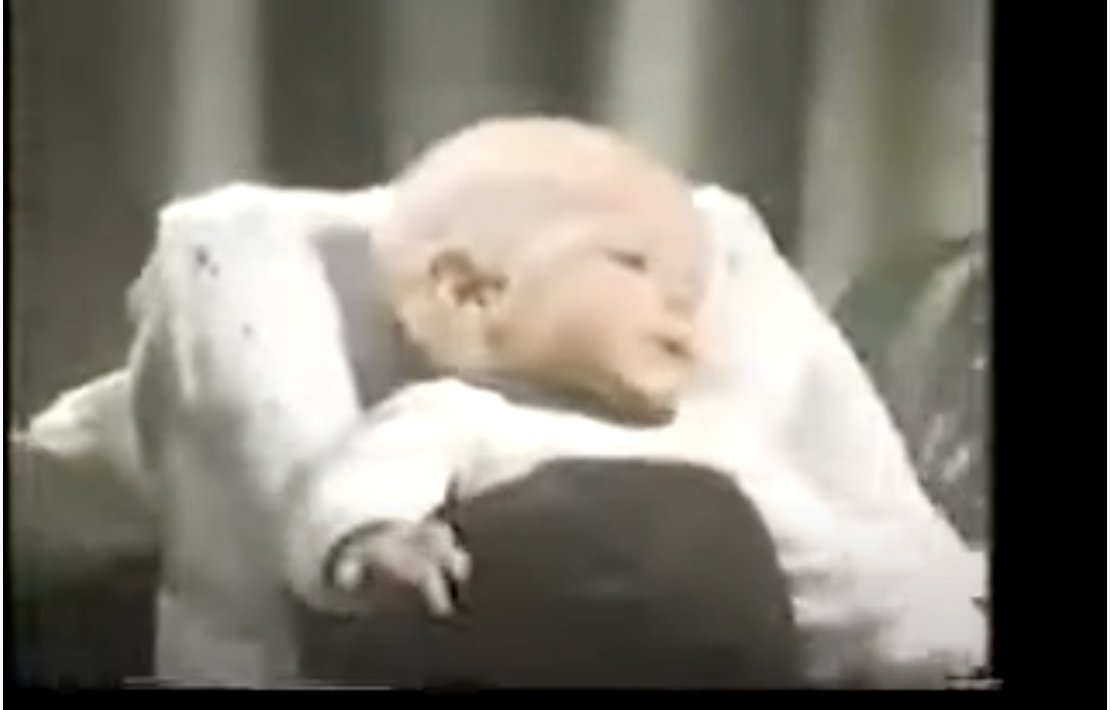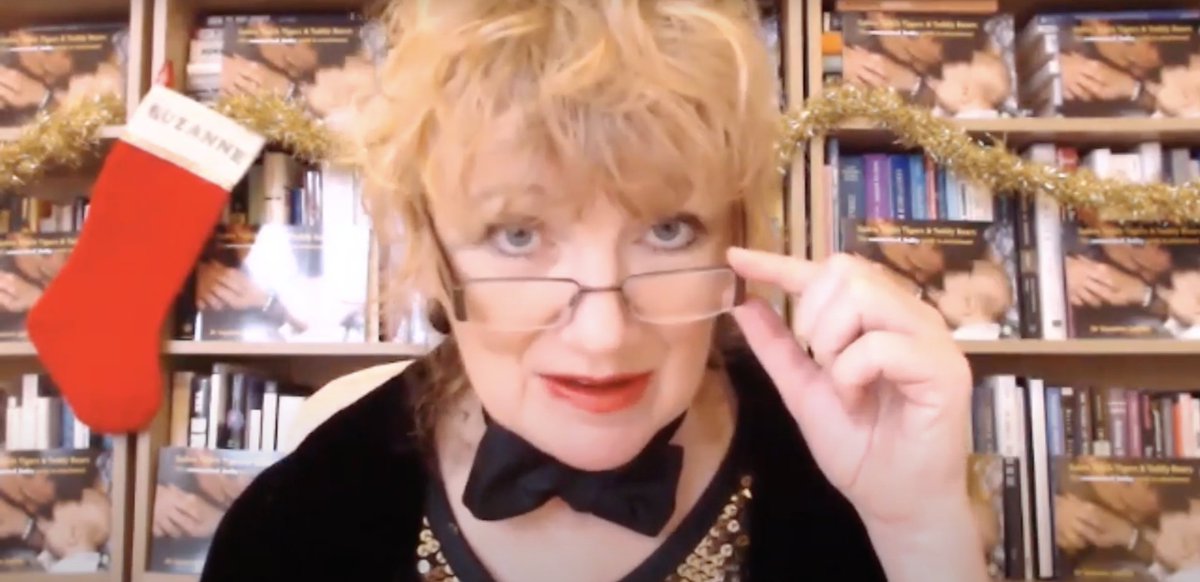
A THREAD on t profound implications of human beings being born connected.
My tweet ystrdy on #CommunicativeMusicality has had lots of engagemnt, so I thought I'd offer more. Let's go back to t late 1960s, whn radical discoveries were being made abt babies.
My tweet ystrdy on #CommunicativeMusicality has had lots of engagemnt, so I thought I'd offer more. Let's go back to t late 1960s, whn radical discoveries were being made abt babies.
2. Anyone who follows my work knows that I am constantly saying "Babies are born already connected." It sounds sweet, but actually it is radical. It was only in the 1960s that infant scientists began to think this. It was a claim that generated major scientific arguments. 

3. Video technology had improved by 1960s, so scientists cd examine infant behaviour in very slow motion. And suddenly it was possible to see all t nuances, the coordination, the sensory complexity that you miss in real time. What did they discover? Babies are born COMMUNICATIVE.
4. Let's look at that earlier video again. What do we see if we look closely? The baby is 10 wks old. He's not looking AT t mother. He's looking WITH t mother. The mutual gaze is a relational moment. He's discoverng what sharing attention feels like. Comfortable or uncomfortable? 

5. Can we think about this radical idea for a moment? It ties in fully with what we now know about attachment & trauma & developing stress systems. A baby is born with a biology ready & eager & able to communicate. How that feels depends on what other people offer back.
6. Mum says in a soft voice "Where's my smile gone?" And the baby smiles! In response! Not because he understands her words, but in response to her warm, quiet tone. His brain perceives her attention is directed to him. He feels he MATTERS to her! Yeah! 

7. When he vocalises, Mum ups the intensity. She takes it as invitation for MORE! Her smile gets bigger and she offers more words, in a faster rhythm. "Yes, Yes, I know! I knew there's gonna be another smilie!"
It's a spontaneous jazz session, with BOTH actively contributing.
It's a spontaneous jazz session, with BOTH actively contributing.

8. Baby thinks somethng like: "OMG. That is so exciting! Mum is sooo much fun!!!" And then? It starts to get a bit TOO excitng, too intense. Watch his hands. They start to move, to flail. He looks away, to calm t excitemnt (to self-regulate). We're seeing his strss systm develop. 

9. What does Mum do? She takes hold of his hands! Is she aware of that? Probably not. Does she do it for a particular reason? Probably not. She's just 'playing'. It seems sweet. But the baby???? He is discovering a LIFE LESSON: what emotional intimacy feels like. 

10. ALL HIS SENSES. All his bodily movements. His muscles, his hearing, his vision, the hormones now pumping through his body. They are all oriented to this jazz exchange. ALL AT THE SAME TIME. His biology is coordinated toward communication. This iconic image conveys that. 

11. This is a radical idea. It is a profound idea. Human beings are born with a biology that is built for relationships. Their brains NOTICE what other people are doing. Their brains think everything those people do MEANS SOMETHING. They read everything as 'intentional'.
12. So when I tweeted earlier this week about new research on how mobile phones change parents' interactns with babies...? That's relevant. If a baby's communicative bids go ignored because parents are often distracted, the baby FEELS ignored.
https://twitter.com/suzannezeedyk/status/1475795677544390656?s=20
13. Whn I tweeted earlier quotng @DrGaborMate on how stress interferes w/ parents' ability to attune to their babies? That's relevant. All t people who replied ths is why we need to support parents? They're right! If parents are stressed, babies notice.
https://twitter.com/suzannezeedyk/status/1475788704052568065?s=20
14. When I tweeted earlier about the work of paediatrician @childinmind ? It's relevant. She keeps saying that if health systems could make space to LISTEN to parents & help them make sense of children's behaviour, lots of problems dissipate.
https://twitter.com/childinmind/status/1472894303835992064?s=20
15. Whn I tweeted abt @SimonPartridge work on early boardng school? He's sayng somethng radical: That t damage many of these childrn experienced goes back further than being sent away at 8. It started as babies, in a culture whr disconnection is t norm.
https://twitter.com/SimonPartridge/status/1474388620001918976?s=20
16. Whn I tweet abt t work of early years settings who focus on helpng t children in their care to feel LOVED, like @lullabynursery? In USA, 25% of new mothers go back to work w/in 2 weeks of birth. What if a baby doesn't feel heard, safe, KNOWN by staff?
https://twitter.com/suzannezeedyk/status/1475820667543199745?s=20
17. Ok, I've moved a long way frm t ground-breaking, fascinating work done by scientists of 1960s & 1970s. I'm workng hard to make sure their theoretical work doesn't stay in t text books. It needs to inform our society, our culture, our professions. Parents deserve to know it. 

18. When @katesilverton publshd her book 'there's no such thing as naughty', she must intentionlly hv chosen a provocative title. Lots of folk will disagree. Our culture is attached to t idea that childrn who behave 'badly' need punished. T idea they are communicatng is radical. 

19. If I can help ppl to be more curious abt babies' capacities, my work is done. If I can help parents realise t power of their hugs & laughter & warmth, my work is done. We're living thru a pandemic. Lots of parents are stressed. This will change our future if we don't get it. 

20/end. THANK YOU to every person who finds ways to ripple out these insights to others. I like knowing I am one member of a big choir, all of us singing loudly. (And, given the season, lets make that a jolly Christmas Carol Choir!)
Seasons Greetings, all.
Seasons Greetings, all.
@paulinescott222 @pauldixtweets @KeeganSmith_Law @janehmul @JANEOROURKE @janeleavey @fionalarkin13 @FJRMonifieth @realdcameron @donnaadamsx @margl43 @eperryinsights @bvcpantarhei @Philippa_Perry @Mr_D_Clark @UpstartScot @kymscott5 @TheBabyExpert @cathymac59 @QueenStreetNS
@gerrydiamond71 @Prev_Justice @kdenvir @KevinNeary12 @DADSWORK @BfN_UK @carajay118 @malseed_natalie @kellydeans3003 @briancar1983 @ShivieSmith @Mr_PaintPots @haynes_wiley @NeilMackay @ThomasHuebl @judithasphar @JudgeWren @GiveTimeScot @Xsharlenemx @PregnantScrewed @stellacreasy
• • •
Missing some Tweet in this thread? You can try to
force a refresh





